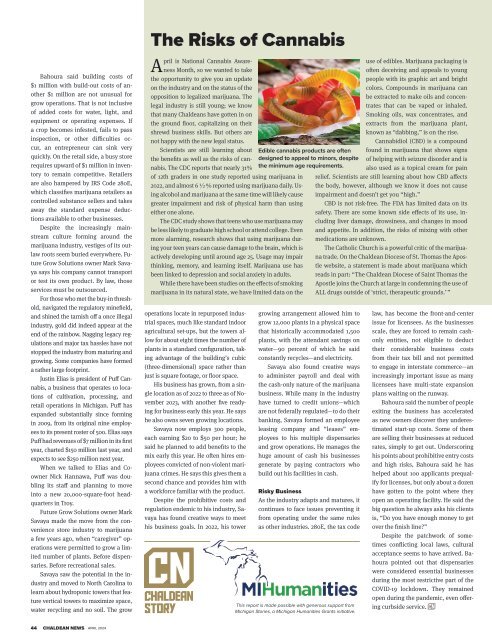You also want an ePaper? Increase the reach of your titles
YUMPU automatically turns print PDFs into web optimized ePapers that Google loves.
Bahoura said building costs of<br />
$1 million with build-out costs of another<br />
$1 million are not unusual for<br />
grow operations. That is not inclusive<br />
of added costs for water, light, and<br />
equipment or operating expenses. If<br />
a crop becomes infested, fails to pass<br />
inspection, or other difficulties occur,<br />
an entrepreneur can sink very<br />
quickly. On the retail side, a busy store<br />
requires upward of $1 million in inventory<br />
to remain competitive. Retailers<br />
are also hampered by IRS Code 280E,<br />
which classifies marijuana retailers as<br />
controlled substance sellers and takes<br />
away the standard expense deductions<br />
available to other businesses.<br />
Despite the increasingly mainstream<br />
culture forming around the<br />
marijuana industry, vestiges of its outlaw<br />
roots seem buried everywhere. Future<br />
Grow Solutions owner Mark Savaya<br />
says his company cannot transport<br />
or test its own product. By law, those<br />
services must be outsourced.<br />
For those who met the buy-in threshold,<br />
navigated the regulatory minefield,<br />
and shined the tarnish off a once illegal<br />
industry, gold did indeed appear at the<br />
end of the rainbow. Nagging legacy regulations<br />
and major tax hassles have not<br />
stopped the industry from maturing and<br />
growing. Some companies have formed<br />
a rather large footprint.<br />
Justin Elias is president of Puff Cannabis,<br />
a business that operates 10 locations<br />
of cultivation, processing, and<br />
retail operations in Michigan. Puff has<br />
expanded substantially since forming<br />
in 2009, from its original nine employees<br />
to its present roster of 500. Elias says<br />
Puff had revenues of $7 million in its first<br />
year, charted $150 million last year, and<br />
expects to see $250 million next year.<br />
When we talked to Elias and Coowner<br />
Nick Hannawa, Puff was doubling<br />
its staff and planning to move<br />
into a new 20,000-square-foot headquarters<br />
in Troy.<br />
Future Grow Solutions owner Mark<br />
Savaya made the move from the convenience<br />
store industry to marijuana<br />
a few years ago, when “caregiver” operations<br />
were permitted to grow a limited<br />
number of plants. Before dispensaries.<br />
Before recreational sales.<br />
Savaya saw the potential in the industry<br />
and moved to North Carolina to<br />
learn about hydroponic towers that feature<br />
vertical towers to maximize space,<br />
water recycling and no soil. The grow<br />
The Risks of Cannabis<br />
April is National Cannabis Awareness<br />
Month, so we wanted to take<br />
the opportunity to give you an update<br />
on the industry and on the status of the<br />
opposition to legalized marijuana. The<br />
legal industry is still young; we know<br />
that many Chaldeans have gotten in on<br />
the ground floor, capitalizing on their<br />
shrewd business skills. But others are<br />
not happy with the new legal status.<br />
Scientists are still learning about<br />
the benefits as well as the risks of cannabis.<br />
The CDC reports that nearly 31%<br />
of 12th graders in one study reported using marijuana in<br />
2022, and almost 6 ½ % reported using marijuana daily. Using<br />
alcohol and marijuana at the same time will likely cause<br />
greater impairment and risk of physical harm than using<br />
either one alone.<br />
The CDC study shows that teens who use marijuana may<br />
be less likely to graduate high school or attend college. Even<br />
more alarming, research shows that using marijuana during<br />
your teen years can cause damage to the brain, which is<br />
actively developing until around age 25. Usage may impair<br />
thinking, memory, and learning itself. Marijuana use has<br />
been linked to depression and social anxiety in adults.<br />
While there have been studies on the effects of smoking<br />
marijuana in its natural state, we have limited data on the<br />
operations locate in repurposed industrial<br />
spaces, much like standard indoor<br />
agricultural set-ups, but the towers allow<br />
for about eight times the number of<br />
plants in a standard configuration, taking<br />
advantage of the building’s cubic<br />
(three-dimensional) space rather than<br />
just is square footage, or floor space.<br />
His business has grown, from a single<br />
location as of 2022 to three as of November<br />
2023, with another five readying<br />
for business early this year. He says<br />
he also owns seven growing locations.<br />
Savaya now employs 300 people,<br />
each earning $20 to $50 per hour; he<br />
said he planned to add benefits to the<br />
mix early this year. He often hires employees<br />
convicted of non-violent marijuana<br />
crimes. He says this gives them a<br />
second chance and provides him with<br />
a workforce familiar with the product.<br />
Despite the prohibitive costs and<br />
regulation endemic to his industry, Savaya<br />
has found creative ways to meet<br />
his business goals. In 2022, his tower<br />
CHALDEAN<br />
STORY<br />
Edible cannabis products are often<br />
designed to appeal to minors, despite<br />
the minimum age requirements.<br />
growing arrangement allowed him to<br />
grow 12,000 plants in a physical space<br />
that historically accommodated 1,500<br />
plants, with the attendant savings on<br />
water—90 percent of which he said<br />
constantly recycles—and electricity.<br />
Savaya also found creative ways<br />
to administer payroll and deal with<br />
the cash-only nature of the marijuana<br />
business. While many in the industry<br />
have turned to credit unions—which<br />
are not federally regulated—to do their<br />
banking, Savaya formed an employee<br />
leasing company and “leases” employees<br />
to his multiple dispensaries<br />
and grow operations. He manages the<br />
huge amount of cash his businesses<br />
generate by paying contractors who<br />
build out his facilities in cash.<br />
Risky Business<br />
As the industry adapts and matures, it<br />
continues to face issues preventing it<br />
from operating under the same rules<br />
as other industries. 280E, the tax code<br />
This report is made possible with generous support from<br />
Michigan Stories, a Michigan Humanities Grants initiative.<br />
use of edibles. Marijuana packaging is<br />
often deceiving and appeals to young<br />
people with its graphic art and bright<br />
colors. Compounds in marijuana can<br />
be extracted to make oils and concentrates<br />
that can be vaped or inhaled.<br />
Smoking oils, wax concentrates, and<br />
extracts from the marijuana plant,<br />
known as “dabbing,” is on the rise.<br />
Cannabidiol (CBD) is a compound<br />
found in marijuana that shows signs<br />
of helping with seizure disorder and is<br />
also used as a topical cream for pain<br />
relief. Scientists are still learning about how CBD affects<br />
the body, however, although we know it does not cause<br />
impairment and doesn’t get you “high.”<br />
CBD is not risk-free. The FDA has limited data on its<br />
safety. There are some known side effects of its use, including<br />
liver damage, drowsiness, and changes in mood<br />
and appetite. In addition, the risks of mixing with other<br />
medications are unknown.<br />
The Catholic Church is a powerful critic of the marijuana<br />
trade. On the Chaldean Diocese of St. Thomas the Apostle<br />
website, a statement is made about marijuana which<br />
reads in part: “The Chaldean Diocese of Saint Thomas the<br />
Apostle joins the Church at large in condemning the use of<br />
ALL drugs outside of ‘strict, therapeutic grounds.’ ”<br />
law, has become the front-and-center<br />
issue for licensees. As the businesses<br />
scale, they are forced to remain cashonly<br />
entities, not eligible to deduct<br />
their considerable business costs<br />
from their tax bill and not permitted<br />
to engage in interstate commerce—an<br />
increasingly important issue as many<br />
licensees have multi-state expansion<br />
plans waiting on the runway.<br />
Bahoura said the number of people<br />
exiting the business has accelerated<br />
as new owners discover they underestimated<br />
start-up costs. Some of them<br />
are selling their businesses at reduced<br />
rates, simply to get out. Underscoring<br />
his points about prohibitive entry costs<br />
and high risks, Bahoura said he has<br />
helped about 100 applicants prequalify<br />
for licenses, but only about a dozen<br />
have gotten to the point where they<br />
open an operating facility. He said the<br />
big question he always asks his clients<br />
is, “Do you have enough money to get<br />
over the finish line?”<br />
Despite the patchwork of sometimes<br />
conflicting local laws, cultural<br />
acceptance seems to have arrived. Bahoura<br />
pointed out that dispensaries<br />
were considered essential businesses<br />
during the most restrictive part of the<br />
COVID-19 lockdown. They remained<br />
open during the pandemic, even offering<br />
curbside service.<br />
44 CHALDEAN NEWS <strong>APRIL</strong> <strong>2024</strong>
















